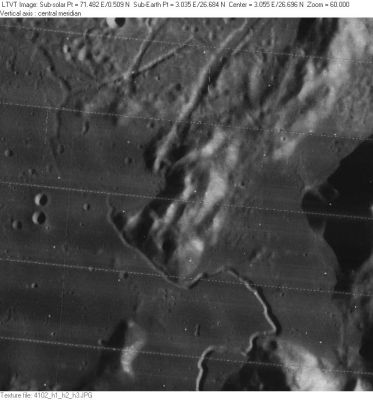Fresnel Ridge
Contents
Fresnel Ridge (Hill 305 - Apollo 15 site nomenclature)
(both Fresnel Ridge and Hill 305 are unofficial names)
|
Lat: 26.66° N, Long: 3.03° E, Diameter: 20 km, Height: 1.5 km, Rukl: 22 |

LO-IV-102H Fresnel Ridge is the hill at the center of this aerial view. Snaking around it to the south and east is Rima Hadley, while to its north and west are the beginnings of Rimae Fresnel. On the right of this image is the shadow of Mons Hadley. The sunlit peak in the lower right, with the 2-km crater St. George on its flank, is Mons Hadley Delta. The ridge, of which Hill 305 is the southern terminus, extends far to the north, but that extension does not appear to be regarded as part of this informally named feature. Note the pair of (officially unnamed) bowl-shaped craters immediately west of Hill 305 (this pair of craters is a fine test object for all sorts of telescopes!).
Images
- AS15-87-11719 is a pre-landing view of the Apollo 15 site. The most south-western part of the Fresnel Ridge (Hill 305) is depicted near the upper right corner of the photograph. The odd peanut-shaped depression is Julienne. Looking west (north is to the right).
- Mike Constantine's assembled panorama of Apollo 15's Station 2 shows the Fresnel Ridge just above Rima Hadley's elbow and its sunlit Trophy Point (the inner curve of the elbow). Note that the southern part of the Fresnel Ridge (Hill 305) looks very much like Mount Hadley, which is the shadowed mountain at the right part of the panorama. The elevation behind the Lunar Roving Vehicle is Bennett Hill. The row of undulating hills near the right margin is the Swann Range. Mount Hadley Delta is near the left margin. - DannyCaes Feb 6, 2008
Maps
(LAC zone 41B4) LAC map Geologic map LM map LTO map
Description
Unofficially named ridge northwest of Apollo 15's landingsite (west of Mons Hadley). The northern end of Rima Hadley runs alongside the southwestern end of the Fresnel Ridge. This part of the Fresnel Ridge was called Hill 305 during the mission of Apollo 15 (summer of 1971). The Fresnel Ridge (Hill 305) is an easy target for telescopic observers and photographers of the Palus Putredinis region.
- DannyCaes Feb 6, 2008
Additional Information
- The position and diameter information given in the title line refer to the Hill 305 area on LO-IV-102H registered to the 1994 ULCN and measured using LTVT. The height information is from Sullivan (1987). - Jim Mosher
The unnamed twins west of Hill 305
- Immediately west of the Fresnel Ridge's southwestern part is an unnamed couple of bowl-shaped craterlets, which is a very interesting target for today's photographers of small lunar surface formations. It is also a good test object for those who want to know if their telescope has the finest optics!
- AS15-P-9804 is one of the ITEK-camera's orbital photographs of the couple (at the right part of the photographic strip). Note the small central peaks in both the craterlets! North is to the right.
- DannyCaes Feb 6, 2008
Nomenclature
- Hill 305 seems to be an informal astronaut-assigned designation, used during Apollo 15 flight planning and operation. The name was also used by Sullivan (1987).
- The origin of Fresnel Ridge is less clear. It appears on a map in the article by Howard, Head and Swann (1972), and is also mentioned by Spudis, Swann, and Greeley (1988). Neither article gives a clear explanation of its extent. - Jim Mosher
LPOD Articles
Amazing Pan -- Andreas Vossinakis's assembled panorama of Rima Hadley/Trophy Point, and the Fresnel Ridge/Hill 305 in the distance.
Bibliography
- Harland, David M. EXPLORING THE MOON, The Apollo Expeditions (Springer, 1999).
- Howard, Keith A.; Head, James W.; Swann, Gordon A. 1972. Geology of Hadley Rille. Proceedings of the Lunar Science Conference, vol. 2, p.1.
- Spudis, P. D.; Swann, G. A.; Greeley, R. 1988. The formation of Hadley Rille and implications for the geology of the Apollo 15 region. in Lunar and Planetary Science Conference, 18th, Houston, TX, Mar. 16-20, 1987, p. 243-254.
- Sullivan, R. 1987. Quantitative Evaluation of Ballistic Sedimentation . Abstracts of the Lunar and Planetary Science Conference, volume 18, page 978.
- Weaver, Kenneth F. TO THE MOUNTAINS OF THE MOON (Apollo 15 Explores the Mountains of the Moon), NATIONAL GEOGRAPHIC February 1972.
- Wood, Charles and Collins, Maurice 21st CENTURY ATLAS OF THE MOON, page 34 (upper left photograph; Hadley Rille), and chart 11 (page 35).